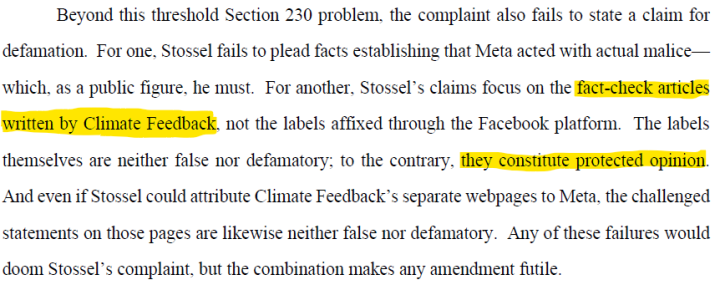Facebook has said its “fact checks” are merely “opinion assertions”.
The social media giant said this in a court filing in response to a defamation suit filed by celebrated American journalist, John Stossel.
The journalist sued Facebook after its “fact checkers” labeled climate change information that Stossel posted as “false and misleading”.
In an article explaining how Facebook defamed him, the 74-year-old wrote:
I made a video that said that California’s wildfires were mostly caused by poor government management. Facebook censored that as “misleading.” They linked to a Science Feedback post that puts the following sentence in quotation marks, as if it were something I said: “Forest fires are caused by poor management. Not by climate change.”
But I never said that!
Stossel said he asked reviewers for Science Feedback – which handled the Facebook review – how his video was misleading and two of them answered that they had not even watched the video.
He added that he drew Facebook’s attention to the error but his concerns were ignored.
“Facebook’s refusal to acknowledge its mistake hurts me because when Facebook fact-checks something, its algorithm makes sure fewer people see that video,” he wrote.
Stossel said that he still did not sue the social media giant until a similar issue arose:
They declared a video I did about the climate “crisis” partly false. This video, “Are We Doomed,” said that climate change is real but suggested that we can adapt to it, as Holland has. That video received 24 million views on Facebook. But after that second Facebook smear, viewership stopped.
I asked a Science Feedback reviewer what was wrong with my climate-crisis video, and he admitted that he and his other fact-checkers found no incorrect facts. Instead, they simply didn’t like my tone.
At that point, Stossel said, he had had enough and approached the court for redress.
He wrote:
I want Facebook to learn that censorship — especially sloppy, malicious censorship, censorship without any meaningful appeal process — is NOT the way to go.
The world needs more freedom to discuss things, not less.
But responding to the defamation claim, Facebook said on Page 2, Line 8 in its court filing that it cannot be sued for defamation (that is, making a false and harmful assertion) because its ‘fact checks’ are mere statements of opinion rather than factual assertions.
Under the First Amendment of the US Constitution, opinions are not subject to defamation claims, while false assertions of fact can be subject to defamation.
According to the social media giant: “The labels themselves are neither false nor defamatory; to the contrary, they constitute protected opinion.”
See screenshot of Facebook’s court filing as shared by ‘Watts Up With That?‘




 Premier League
Premier League